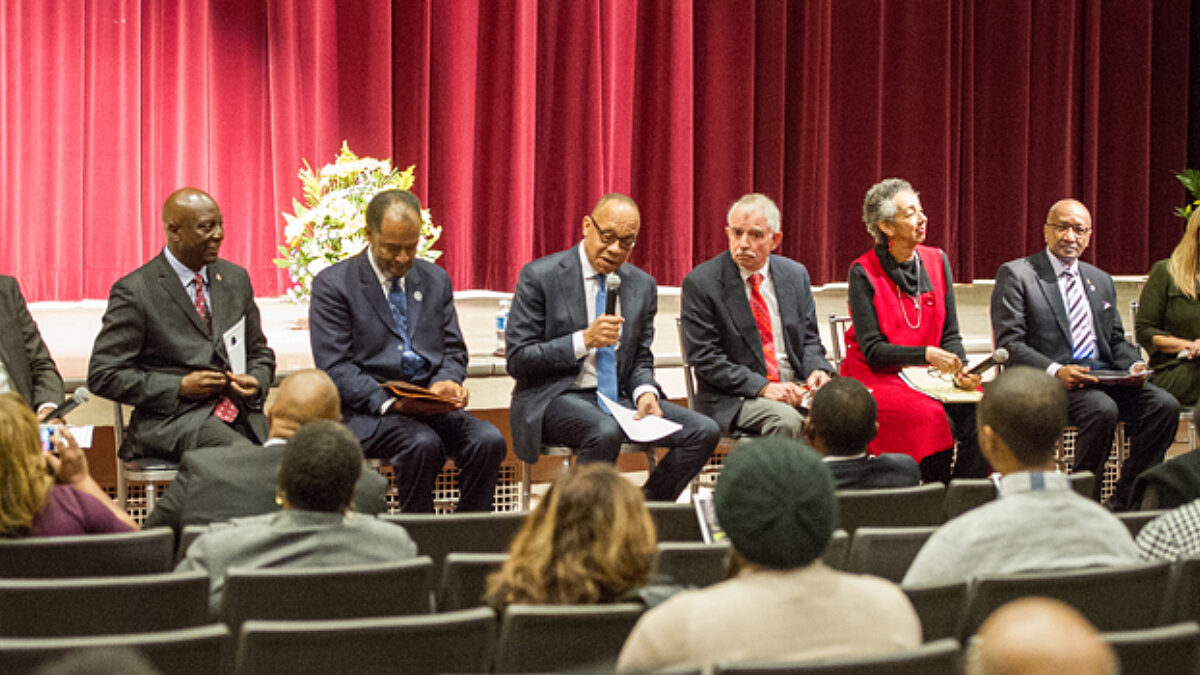
Race relations and the role of the church
Trinity UMC presents free forum featuring Rep. Clyburn, Bishop Matthews, Sellers, Salley, more
By Jessica Brodie
ORANGEBURG—When it comes to race relations, the church has a big role to play in leading the conversation and speaking out about what is right.
That was the thrust behind a forum and panel discussion on “Race Relations and the Role of the Church: Then and Now,” held at Claflin University Jan. 28.
The forum, presented at Claflin by Trinity United Methodist Church in honor of its 150th anniversary last year, featured as moderator Orangeburg native Eugene Robinson, a Pulitzer Prize-winning journalist and associate editor of the Washington Post. Trinity had served as a meeting place for students to plan strategy for their demonstrations during the Civil Rights Movement, as well as meetings led by civil rights leaders such as Roy Wilkins, Jesse Jackson, Thurgood Marshall and Dr. Martin Luther King Jr.
A number of leaders participated in the Jan. 28 forum, including Congressman James E. Clyburn, who represents South Carolina’s 6th District; Bishop Marcus Matthews, retired UMC bishop in the Northeastern Jurisdiction; Dr. James Salley, associate vice president for Africa University; Dr. Cleveland Sellers, former president at Voorhees College and a survivor of the Orangeburg Massacre; Dr. Millicent Brown, a noted historian and educator; Dr. William Hine, a retired history professor and civil rights activist; and Joan Mooney, president and chief executive officer of the Faith and Politics Institute.
Cecil Williams, an award-winning photographer and civil rights historian, also shared a special video presentation of his 1960s era photography prior to the discussion.
The room was rapt as Williams shared his photos through the video presentation.
“The church has always been the cornerstone of the community, where we could go and plan our marches and gatherings,” Williams told the crowd; he said people used lawsuits, challenges, marches and demonstrations to bring awareness to the need for civil rights.
He also shared photography and discussion about the Orangeburg Massacre of 1968, when three unarmed students were killed by police officers.
Claflin President Dr. Henry Tisdale welcomed the crowd to the forum, noting that Claflin, Trinity and nearby South Carolina State University have been at the forefront of the Civil Rights Movement.
“Dr. King said the real fight was going to be the fight for real equality and real economic justice. That’s the fight we’re in today,” Tisdale said, thanking those present for their role in making that happen.
Robinson began the panel discussion by noting “we are living in a really weird ‘now,’” and he said that during the election and for the last couple of years he has seen a “kind of old-school racism in some of the comments and remarks that I haven’t seen since the old days.”
This makes the day’s discussion all the more critical, Robinson noted.
Clyburn said the country has always moved on a pendulum clock—far left, then far right. It was more left with the election of President Barack Obama, but it has moved far right in the last election.
“Always remember that when the pendulum is going left to right it always passes through the center,” Clyburn said. “This country has always spent more time center-left and center-right. It only takes the intervention of the voters to stop us from moving far left and far right.”
Brown agreed, though she noted, “I’m not as optimistic. … We must be very, very vigilant and participate at every level; it’s not inevitable that things will get better.”
Sellers said racism is still very pervasive in society.
“I think we have to be very concerned about our babies,” Sellers said. “We haven’t told them it’s not going to be easy. When you get knocked down, you’ve got to scramble to get back up. … We need to talk about ways we can get our young folks on track (with standing up against racism).”
Mooney said today, we stand on the shoulders of people who put everything on the line. She said the Obama administration gave so much hope to people.
“It’s easier to dream if you see an example of someone who looks like you,” Mooney said, noting she thinks the nation’s pendulum will swing back, and perhaps more quickly when the church plays a bigger role.
Bishop Matthews shared greetings from South Carolina Resident Bishop Jonathan Holston, who was not able to be in attendance. Matthews said the UMC has continued to struggle against racism.
“On the good days I can really see our church trying to address the needs of persons,” Matthews said—but it’s not an easy fight.
But Salley said it’s a fight that is absolutely necessary, as the church must play a role.
“If the church is not in the community, then it’s not serving its purpose,” Salley said, noting he, too, believes the pendulum will swing back, hopefully sooner than later.
The forum also discussed the Orangeburg Massacre, including why so many people are ignorant about it. The leaders noted how for many years it was intentionally blocked from the media and intentionally kept out of history books. That is now changing.
Sellers said it is important to stay vigilant as we move forward, both as a church and as a society.
“We have to come to grips with how we get ourselves organized,” Seller said.